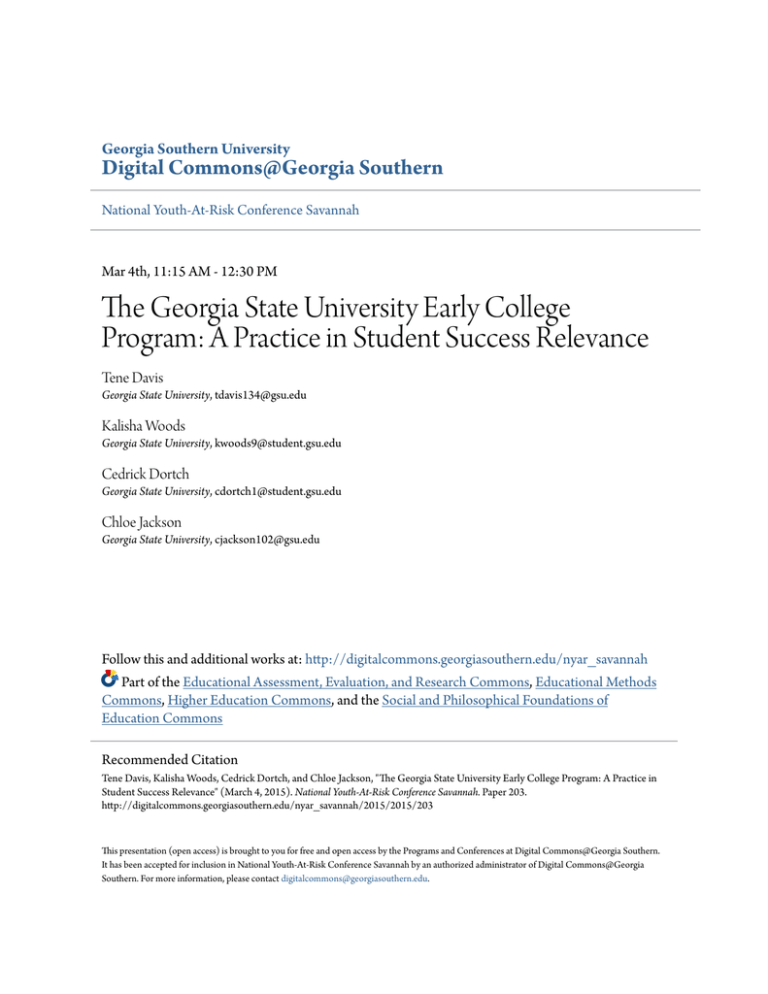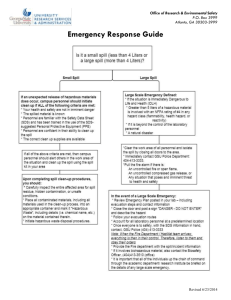The Georgia State University Early College Program
advertisement

Georgia Southern University Digital Commons@Georgia Southern National Youth-At-Risk Conference Savannah Mar 4th, 11:15 AM - 12:30 PM The Georgia State University Early College Program: A Practice in Student Success Relevance Tene Davis Georgia State University, tdavis134@gsu.edu Kalisha Woods Georgia State University, kwoods9@student.gsu.edu Cedrick Dortch Georgia State University, cdortch1@student.gsu.edu Chloe Jackson Georgia State University, cjackson102@gsu.edu Follow this and additional works at: http://digitalcommons.georgiasouthern.edu/nyar_savannah Part of the Educational Assessment, Evaluation, and Research Commons, Educational Methods Commons, Higher Education Commons, and the Social and Philosophical Foundations of Education Commons Recommended Citation Tene Davis, Kalisha Woods, Cedrick Dortch, and Chloe Jackson, "The Georgia State University Early College Program: A Practice in Student Success Relevance" (March 4, 2015). National Youth-At-Risk Conference Savannah. Paper 203. http://digitalcommons.georgiasouthern.edu/nyar_savannah/2015/2015/203 This presentation (open access) is brought to you for free and open access by the Programs and Conferences at Digital Commons@Georgia Southern. It has been accepted for inclusion in National Youth-At-Risk Conference Savannah by an authorized administrator of Digital Commons@Georgia Southern. For more information, please contact digitalcommons@georgiasouthern.edu. Early College at Georgia State University Tene Davis, PhD., Associate Director Kalisha Woods, EPY Doctoral Student, GRA Cedrick Dortch, EPY Doctoral Student, GRA Chloe Jackson, M.A., Lead Study Coach Georgia State University Outline of Presentation • • • • • Introduction to GSU Early College Relevance to Conference Strand Evidence of Success Guiding Research Questions/Comments Brief Description • Bill & Melinda Gates Foundation’s Early College High School Initiative: – Carver Early College (2005) – Washington High School - Early College Program (2009) • Program objective: – to offer first-generation, students of color, and students of low SES backgrounds the opportunity to earn considerable college credit while pursuing their high school diploma • Practices utilized to promote college readiness and access: – Parent orientations/manual/emails – College Readiness Course – Summer Enrichment – Touch-Ins – Study sessions – Professional Luncheons – Supplemental programs – Grade reporting Relevance • Close the “achievement gap” for those traditionally underperforming populations • ECHSI philosophy – when challenged, underrepresented populations in higher education will rise to the challenge of a rigorous and accelerated high school curriculum while beginning their college tenure in high school. • ECHSI looks to address the issues of high school dropout, postsecondary readiness, and career readiness • Georgia State Early College program has worked successfully to – reduce the “achievement gap” – introduce the option of college – introduce successful programs and strategies focused on high school graduation and college and career readiness. Evidence • National Data– High School Graduation Rates • 78% of Traditional Students • 90% of Early College Students – Post-Enrollment Rates • 68% of Traditional Students Enrolled in Post-secondary Institutions • 71% of Early College Students Enrolled in PostSecondary Institutions Evidence • National Data – Credits Earned • Average 38 college credits earned by Early College students across US – Degree attainment post-high school graduation • One year: 1% of Traditional students & 21% Early College students • Two years: 5% Traditional students & 25% Early College students Evidence at GSU • Numbers/accomplishments through programming at GSU – 90% Retention Rate at GSU – Average of 19.8 Credits earned by Early College students at GSU – 100% Accepted into 2- or 4 year colleges/universities – 92% of GSU Early College Students Enrolled in PostSecondary Institutions in 2014 – 83% of 2009 graduating class still pursuing postsecondary degrees, while 15% have graduated. Evidence at GSU via Programming • Program Evaluation Surveys (Please see handout) – Summer Enrichment – College Readiness – Touch-Ins – Study Sessions – Former Early College students Guiding Research Black Empowerment Theory The process by which persons gain the ability to obtain & utilize resources to achieve individual or collective goals, & to manage emotions, knowledge, skills or material resources in a way that allows for effective performance of social roles. In addition, the ability to navigate ecological barriers. – Tutor • Training – Mentorship – Students • Cohorting Guiding Research Motivation • Growth Mindset Theory The belief that intelligence can be developed whereby learning is the ultimate goal. • Goal Setting • Academic & career goals • Accountability Guiding Research • Student Support – TRIO Services – Student Integration Models Guiding Research • Black Segregated School – Strong Leadership – Caring Teachers – Academic Curriculum/Extracurricular Activities – Community and Parent involvement Contact Information Associate Director- Tene Davis, Ph.D. tdavis134@gsu.edu Early College Liaison- Kalisha Woods- kwoods9@student.gsu.edu Early College Liaison- Cedrick Dortch- cdortch1@student.gsu.edu Lead Study Coach- Chloe Jackson- cjackson102@gsu.edu Office: 404-413-8074
